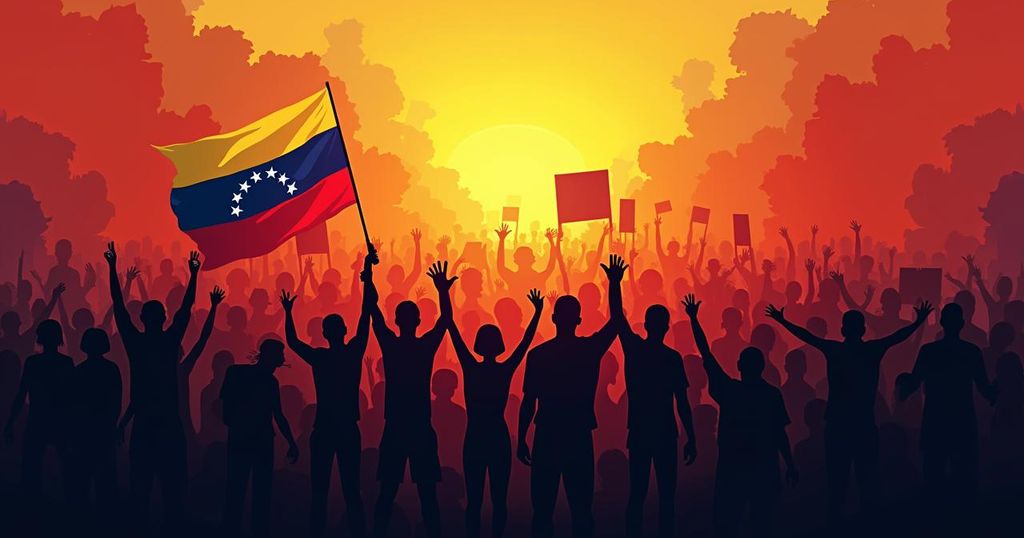Opposition Protests Erupt in Venezuela Over Disputed Presidential Election Results
Small opposition protests occurred in Venezuela to contest the integrity of the July 28 presidential election results, which President Nicolas Maduro claimed to have won. Opposition leader Maria Corina Machado encouraged smaller gatherings to avoid violent security crackdowns, as tensions persist following the disputed election that left 27 people dead and led to thousands of arrests.
On Saturday, small groups of opposition protesters convened in Venezuela, coinciding with the two-month mark since President Nicolas Maduro purportedly secured victory in the contested presidential election held on July 28. Opposition leader Maria Corina Machado, who is currently in hiding after accusing the electoral results of being fraudulent, advocated for smaller gatherings to mitigate the risk of violent security responses observed during previous protests. Approximately 30 individuals congregated in a plaza in Caracas, vocally expressing their dissent against the Maduro administration. Among them was Leida Brito, affectionately known as the “Red Helmet Grandmother” due to her long-standing activism against the government. She held a placard stating, “To defend the vote is a right,” while asserting, “Nicolas Maduro should leave because he lost.” Retired Colonel Hidalgo Valero denounced the oppressive climate in Venezuela, stating, “The freedom of Venezuela is in danger. Today our people are afraid to be in the streets because there is tremendous repression.” Meanwhile, Machado reassured her supporters via a voice message: “Here we are standing firm, advancing every day with more strength and enthusiasm, gathered here as the brave and good Venezuela.” Since the controversial election, there have been widespread arrests of opposition figures, with over 2,400 Venezuelans detained for alleged terrorism related to protest involvement. The aftermath has been violent, with reports indicating that 27 individuals lost their lives in clashes following the election. The opposition contends that their candidate, Edmundo Gonzalez Urrutia, received 67% of the votes, contrasting with the 52% claimed by Maduro, as stated by the National Electoral Council, which has yet to provide the necessary detailed results as mandated by law. After fleeing the country to seek asylum in Spain, Gonzalez Urrutia, a 75-year-old retired diplomat, recently surfaced in Madrid, where he was warmly welcomed by supporters waving the Venezuelan flag. There were also larger demonstrations supporting the opposition outside Venezuela, occurring in cities such as Mexico City, Buenos Aires, Panama City, and Montevideo. In Caracas, hundreds of Maduro supporters participated in a march to celebrate the election results. During this rally, Maduro mockingly referenced Machado, stating, “the supposed queen bee … is beginning to pack her Gucci suitcases … she is preparing to leave, too,” asserting their presence on the streets as a show of strength. In a recent statement, approximately 30 nations, spearheaded by the United States and Argentina, called upon Maduro to dialogue with the opposition, advocating for “constructive and inclusive discussions” aimed at facilitating a democratic transition, as well as the immediate release of individuals detained due to the election turmoil.
The political landscape in Venezuela has been marred by accusations of electoral fraud and widespread unrest following the July 28 presidential election, which President Nicolas Maduro claimed to have won amidst serious allegations from the opposition. The opposition, led by figures such as Maria Corina Machado, argues that the election was unfair and that their candidate actually won. This situation has led to significant tensions, repression, and international calls for dialogue and accountability. The aftermath has been characterized by protests, numerous arrests, and violent confrontations, creating a sense of urgency regarding the future of democracy in Venezuela.
In summary, the ongoing political crisis in Venezuela continues to escalate, characterized by a stark divide between the regime of President Nicolas Maduro and the opposition. Protests demanding accountability and a restoration of democracy persist, with international observers expressing concern over human rights violations and the lack of a credible electoral process. As the situation unfolds, calls for dialogue and discussion remain crucial for a potential resolution.
Original Source: www.voanews.com




Post Comment